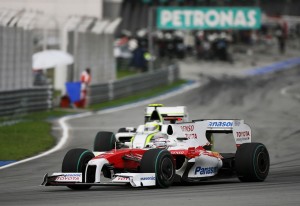There’s the sport of racing, the business of racing and the politics of racing.
All three are being negatively affected by the ongoing Global Great Recession and the wallop it has delivered to automakers.
Nowhere is this clearer than in Formula One racing, once considered the pinnacle of the sport. And well it should have been, went its wildly profitable promoters, considering its international audience reaching a claimed 100 million or more for some races, and drivers who routinely made $20 million-plus annually as they flew in private jets to some of the world’s most expensive and exotic locations.
But that may soon be past tense
Last month, the Formula One Teams Association, comprised of the top eight FI teams, threatened their own racing war of independence from the sport’s sanctioning body, the scandal-wracked Federation Internationale de l’Automobile (FIA).
A war of words ensued, with the FIA saying “lawyers have now examined the FOTA threat to begin a breakaway series. The actions of FOTA as a whole, and Ferrari in particular, amount to serious violations of law including willful interference with contractual relations, direct breaches of Ferrari’s legal obligations and a grave violation of competition law. The FIA will be issuing legal proceedings without delay.”
Ultimately a compromise was reached that — it was claimed at the time– would significantly cut the costs that teams incur by designing, building and running extremely sophisticated, purpose-built cars for one season. Ah, but that gets into the business and politics of racing, which are as conflicted by as many agendas, as there are teams competing to win.
Well, here we go again. The Associated Press has just reported that FOTA has walked out of a cost cutting meeting in Europe earlier today.
And the costs — at hundreds of millions of dollars, up to $500 million per team — are out of control at the very time sponsors are hobbled by the worst economic collapse in global trade since WW2. Each team competing in Formula One World Championship now travels at least 100,000 miles a year between races and test sessions — with some of the larger car constructors, which are running one or more test teams, doing much more than that. And they do that to win, which results in fat sponsorship contracts, or at least that was the case once upon a pre-financial meltdown time.
Most teams ship three cars, one spare chassis and several spare engines plus parts to a race site. For the non-European races — all Formula One teams are based in Europe — equipment has to be flown out on special cargo planes. And as with all other aspects of a sport gone technology and spending mad, teams have created their own specially designed cargo crates, to fill all available space in the plane. It’s just one, small example of how absurd the F1 circus has become.
Now the squeeze is on and FOTA says it wants to roll back the cost clock by a decade more, but is obviously not working real well with the FIA’s proposals. There might be another agenda here, one that involves the politics of racing as makers chafe against FIA management. And that’s no surprise considering the stranglehold the very, very rich and very, very domineering Bernie Ecclestone has on the series, who likes the way Hitler got things done. And then there’s the egregious FIA president Max Moseley, the son of Sir Oswald Mosley, leader of the British Union of Fascists.
The business of racing is in play too. Honda, under financial pressure that resulted in a $2 billion loss, sold its vaunted F1 team and took a financial write-down on the transaction.
Yesterday, Fuji International Speedway issued a statement that said it will not host the Japanese Grand Prix in 2010.
“It has become extremely difficult for us to host the F1 Grand Prix as we face the deteriorating economic environment and see few signs showing a swift economic recovery,” the racetrack said. Since Fuji is more than 90% owned by Toyota, speculation immediately started about Toyota’s future in F1 given its record making losses in 2008, with another projected record-making loss of almost $6 billion coming in 2009.
And now FOTA and FIA have resumed their political war of words.
FIA said today in a statement after the aborted meeting: “the FIA today met the teams which have entered the 2010 Championship to seek their agreement to these changes. All changes have now been agreed subject only to the maintenance of the minimum weight at 620 kg and the signing of a legally binding agreement between all the teams competing in 2010 to reduce costs to the level of the early 1990s within two years, as promised by the FOTA representative in Paris on 24 June. The eight FOTA teams were invited to attend the meeting to discuss their further proposals for 2010. Unfortunately no discussion was possible because FOTA walked out of the meeting.”
FOTA responded: “During the course of this meeting, the team managers were informed by Mr. Charlie Whiting of the FIA that, contrary to previous agreements, the eight FOTA teams are not currently entered into the 2010 FIA Formula One World Championship and have no voting rights in relation to the technical and sporting regulations thereof.”
Late last month when the alleged compromise was agreed, the FIA said that the FOTA teams were accepted, as the 2010 regulations were being worked out. Now, it seems, they are not and will not have a say in the new rules. But without them, there will be no 2010 season. Unlike a F1 race, which has a two-hour time limit, this race for advantage will go on indefinitely — until the real racing stops…


